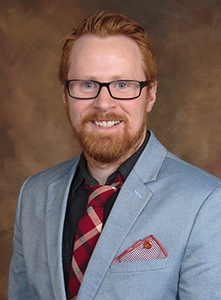COVID-19 has presented new challenges for individuals with ASD and their families, starting with curtailed access to essential services and rippling out to potentially life-altering changes. Ever-changing stay-at-home orders have led to ongoing uncertainty for health and safety, as well as a positive outlook for the future. The impact of social distancing on mental health is an ongoing concern, as are the negative effects on the economy and permanent changes to health and safety measures. The “normal” way of life may never return, yet despite these significant issues, there is the potential for positive change for individuals with ASD.

John Bryson, MS Ed, CESP
Consider the explosion in telecommuting over the last few months. The world has seen a record number of employees working remotely. Countless companies have transitioned their businesses to virtual platforms and project management software. Some companies, experiencing remote work for the first time, are learning its many benefits: increased productivity, performance, engagement, retention and profitability (Farrer, 2020). A friend of mine, who is on the spectrum, works for a company that is new to telecommuting. An active advocate for disability rights, he recently shared that thanks to his current remote situation, he is happier than he has ever been. He feels more motivated, more productive and less stressed. He also reported a decrease in anxiety and depression symptoms. He feels optimistic that his option to work remotely will become permanent and these health and wellness benefits will continue.
When companies reopen, many will likely maintain remote work options, whether as an accommodation for certain employees or a universally adopted practice. Individuals with ASD, who need or prefer to work in a more individual setting and use technology to work from environments tailored to their needs, may find that employers are more willing than ever to meet these needs. The embrace of remote work opportunities for all employees will create a more generous space for employees with autism to receive the supports necessary to truly thrive.
Another acquaintance with ASD worked in a communal job environment for 25 years, masking the characteristics of his diagnosis from his colleagues. The demands of daily social interactions became overwhelming, and hiding his symptoms daily had a profoundly deleterious effect on his wellness. Eventually, he was diagnosed with Post Traumatic Stress Disorder (PTSD) and was unable to continue working. Reflecting on his career path, he believes that had he been supported to feel comfortable about disclosing his disability rather than masking it, he would not have experienced the stress that caused him to lose his job. Greater awareness of how flexibility can contribute to the success and well-being of employees with disabilities will translate to more positive work environments for all employees.
Universal design – designs for the disability community that can be widely generalized – will likely see an uptick in the areas of health and safety. More spacious workplaces, which have been a necessity for some people with disabilities, will now be required for all due to social distancing. Social norms like handshakes, hugs and pats on the back, which were avoided for people with autism who are sensitive to touch, will become common for all. There will be fewer people in stairwells, hallways and elevators, as companies and buildings try to minimize the possibility of a surge in COVID-19 cases. Flexibility and support will be absolute necessities for any company wishing to retain a healthy workforce, and individuals with ASD will benefit.
Many companies will have to rebuild their customer base. Post-COVID-19, consumers are likely to spend cautiously and favor value-specific services, like curb-side pick-up, or health and safety over brand loyalty (Bhargava, Buzzell, Sexauer, & Charm, 2020). Competition to regain consumers and attract new ones, using every strategy, will be fierce. In this scenario, I believe that disability-inclusion hiring strategies are a post-COVID-19 business solution. A national survey in the US found that 92% of consumers felt more favorable toward companies that hire people with disabilities (Siperstein, Romano, Mohler, & Parker, 2006). When companies reevaluate their labor needs, hiring individuals with ASD and other disabilities will renew their workforce and appeal to consumers. Disability inclusion is an innovative solution to post-COVID-19 business growth.
The saying “don’t let this crisis go to waste” has been a commonly used phrase recently. For individuals with autism, the silver lining to this crisis may be greater understanding and accommodation of their needs, which have become universal needs for all of us. If this shared experience has taught us anything, it is that when backed into a corner and united, humanity will innovate and create radical new ways – or expand existing paths – of living to survive and thrive. Rather than going back to normal, let’s strive for a new and better normal.
References
Bhargava, S., Buzzell, C., Sexauer, C., & Charm, T. (2020, May 12). Consumer sentiment evolves as the next “normal” approaches. Retrieved May 12, 2020, from www.mckinsey.com/business-functions/marketing-and-sales/our-insights/a-global-view-of-how-consumer-behavior-is-changing-amid-covid-19
Farrer, L. (2020, February 12). 5 Proven Benefits of Remote Work for Companies. Retrieved May 8, 2020, from www.forbes.com/sites/laurelfarrer/2020/02/12/top-5-benefits-of-remote-work-for-companies/
Siperstein, G. N., Romano, N., Mohler, A., & Parker, R. (2006). A national survey of consumer attitudes towards companies that hire people with disabilities. Journal of Vocational Rehabilitation, 24, 3-9.






Good evening! What a brilliant article. Seeing that silver lining and finding ways to monetize it for the greater good, what a great success! I had a chat with Nish today and will be meeting with you and him on April 12th. What an honor. I am absolutely thrilled to have stumbled onto your company and your passions. I am truly inspired and look forward to strategizing to find more ways to empower those traditionally relegated to lesser opportunities. I am very much looking forward to seeing how I can do my small part to change things for the better. Another pebble sending ripples, far reaching in so many directions. I hope you have a wonderful weekend. Take care until then, Aimee